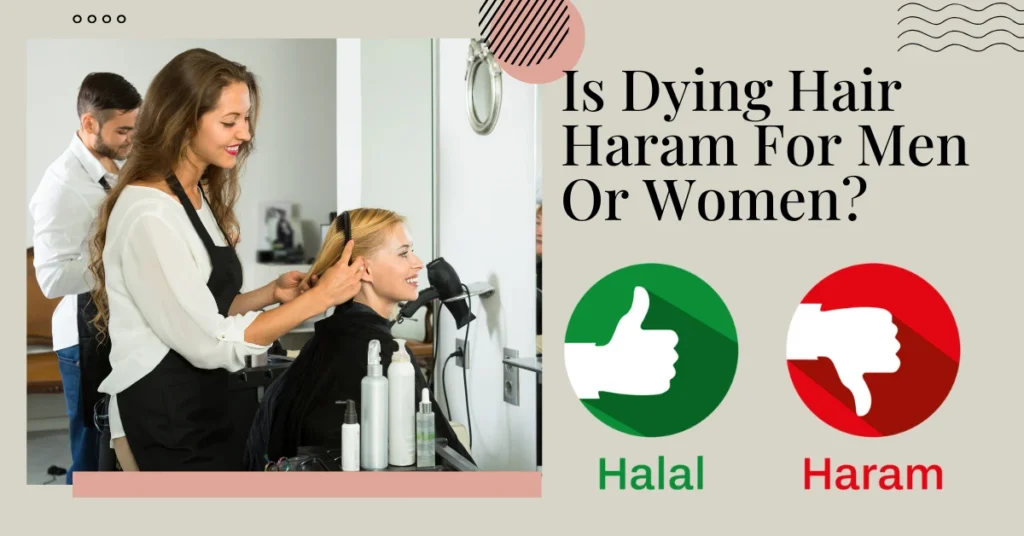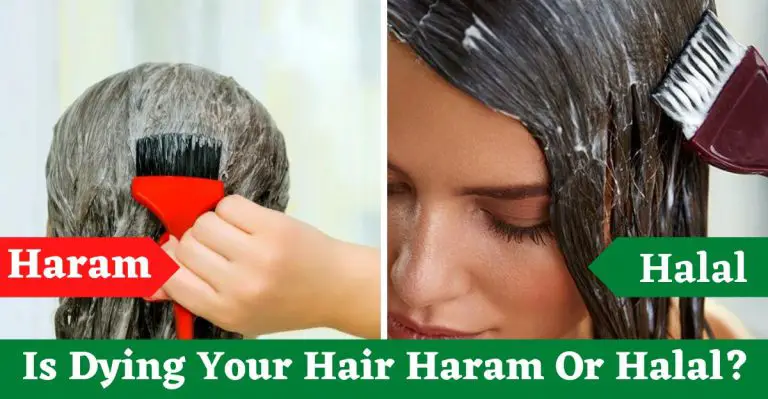Is Dying Your Hair Haram? There is much debate about whether, is dying your hair haram, or forbidden by Islamic law and teachings. Some scholars argue that since the Prophet Muhammad (PBUH) never dyed his hair, this supports the idea that Is Dying Your Hair Haram can be answered with a yes. Others contend that coloring one’s hair is a personal choice and therefore permissible under Islamic laws.
When discussing this topic, it is important to note that there are two main categories in which we can place haram practices:
- Those That Involve Physical Activities
- Those That Involve Material Products
The former includes acts such as gambling and drinking alcohol. The latter includes things like dyes with questionable ingredients.
| Some experts claim that all appearance-altering acts fall under haram, leading many to ask, Is Dying Your Hair Haram even if done with good intentions? because they contravene the idea of “Tahara,” or cleanliness and purity as prescribed by the Quran and Hadith (the teachings of Prophet Muhammad). Therefore many scholars consider dying hair as haram. |
When exploring Is Dying Your Hair Haram, it’s important to consider not just the act, but also the intent and impact behind it. There are a number of factors that should be taken into account when considering haram behaviors, such as intent and any negative impacts it might have on others.
For example, some Islamic scholars argue that if coloring one’s hair is done in an effort to attract the opposite gender, then it is haram. In some interpretations, if dyeing hair causes discomfort or attracts unwanted attention, it may support the view that Is Dying Your Hair Haram has a valid basis. by Islamic standards.
Is Dying Your Hair Haram?
Even though not clearly prohibited, many factors influence the ruling on Is Dying Your Hair Haram in Islamic practice there still may be consequences associated with doing so depending on your particular situation – such as violating wudu (ritual cleansing) as it prevents the water from reaching the roots of the hair.
What Type Of Dyes Are Haram In Islam?
Generally, there are three types of dyes for coloring one’s hair:
- Permanent Dye
- Semi-Permanent Dye
- Natural Dye
When asking Is Dying Your Hair Haram, permanent dyes are often criticized due to their chemical content and long-lasting alteration of natural appearance. Semi-permanent dye is less intense than permanent but still contains some harsh ingredients.
Natural dyes are generally plant-based and use natural herbs and oils for coloring. It is important to note that all three types of dyes must abide by Islamic law.
For example, haram substances such as alcohol cannot be used in any type of dye, and ingredients that contain animal-derived products must also be avoided. Furthermore, haram dyes should not contain toxic or carcinogenic ingredients and should only be used on clean hair.
What Ingredients In Dye Are Haram?
Scholars believe that dyes using any forbidden animal-derived product or alcohol or unhygienically and unlawfully prepared elements causing damage to one’s health are the border ingredients to be avoided as they are considered haram.
There are three major haram dye categories:
- Those Derived From Animal Sources
- Those Containing Animal By-Products
- Those Containing Alcohol.
Animal-sourced dyes include pigments extracted from cow’s blood and enzymes taken from sheep’s wool. Animal by-products are often found in hair care products like shampoos and conditioners which contain animal fats or collagen extracts.
Ingredients like ethanol or methanol in hair dyes are among the reasons why some scholars answer Is Dying Your Hair Haram in the affirmative. and can be toxic if ingested or inhaled.
Another argument often used against dyeing hair in Islam is the Prophet Muhammad’s famous saying “God does not love for you [to do] adornment,” which implies that beautifying oneself with artificial means is forbidden in Islam.
In addition, haram dyes should not contain any toxic or carcinogenic ingredients. As such, when choosing a dye for one’s hair it is important to check the list of ingredients and make sure that none of them is haram as per Islamic teachings and are prioritized to be halal certified.
Is Dying Hair Haram For Men Or Women?

While some say it is permissible for men given certain circumstances such as greying or thinning hair, others deem it strictly forbidden according to Islamic law due to its potential for self-adornment purposes.
When it comes to whether men should dye their hair or not, there does not seem to be a consensus amongst scholars on this matter either.
As for women, opinions vary depending on whether they cover their head with a hijab or otherwise maintain modesty in accordance with Islamic teachings – which could potentially lead to less emphasis on physical appearance and more focus on internal beauty instead.
Is Bleaching Hair Haram?
Bleaching hair is haram according to Islamic law. Bleaching can cause damage to the hair and scalp, leading to dryness and brittleness, as well as an increased risk of skin irritation and other health issues.
Moreover, bleaching often requires the use of corrosive chemicals like hydrogen peroxide which are haram according to some Islamic scholars.
Furthermore, bleaching is often done for the purpose of achieving an unnatural hair color which is haram as it does not adhere to Islamic teachings about modesty and self-adornment.
Is Dying Hair During Ramazan Haram?
It is haram to dye one’s hair during the month of Ramazan as it involves changing one’s natural state and could be seen as a form of self-adornment.
In addition, dyeing hair during this time can also be physically taxing and prevent oneself from performing one’s religious obligations such as fasting during the day. Some scholars suggest that during Ramazan, one should refrain from non-essential grooming—raising the question, Is Dying Your Hair Haram during this holy month?
Can Dying Hair Violate Wudu Or Namaz?
Dyeing hair can violate wudu, or ritual ablution before prayer, and namaz, the ritual prayer of Muslims.
If dye is applied to one’s skin or scalp, it will invalidate their wudu as haram substances are not allowed to come into contact with any part of the body during this time.
Similarly, haram substances like alcohol-based dyes can also invalidate one’s namaz as they are not in accordance with Islamic teachings. Therefore, haram dyes should be avoided when performing either of these sacred acts.
Frequently Asked Questions
1. Is Dying Beards Haram?
Yes, it is haram to dye one’s beard as it involves changing the natural state of one’s body and can be seen as self-adornment.
2. Is Semi Permanent Hair Dye Allowed In Islam?
Semi-permanent hair dye is permissible in Islam as long as it does not contain haram ingredients and is free of toxic chemicals. Additionally, the purpose of using semi-permanent hair dye should not be for self-adornment purposes.
3. Is It Haram to Dye Your Hair Black with Henna?
Yes, it is haram to dye one’s hair black with henna as this is considered a form of self-adornment. Additionally, some forms of henna contain haram ingredients and can be damaging to the hair. Therefore, henna should not be used for dyeing purposes.
4. Is It Haram To Dye Your Hair Black?
No, it is not haram to dye one’s hair black as long as the dye does not contain haram ingredients and the purpose of doing so is not for self-adornment. Furthermore, black hair dye may be preferable for men who are starting to grey or thin out their hair.
5. Is Hair Dying A Sin?
No, hair dying is not necessarily a sin in Islam as long as haram ingredients are avoided and the purpose of doing so is not for self-adornment.
Men may dye their hair in certain circumstances such as graying or thinning hair, while opinions vary among Islamic scholars for women depending on whether the dye is for self-adornment purposes or not.
6. Is Permanent Hair Dye Halal?
Permanent hair dye is haram according to some Islamic scholars as it involves changing one’s natural state and can be seen as a form of self-adornment. Additionally, haram ingredients such as alcohol should not come into contact with any part of the body.
Therefore, permanent hair dye should be avoided.
Conclusion
Is Dying Your Hair Haram? The answer depends on intent, product content, and alignment with Islamic values around modesty and purity. We hope that this blog post includes everything you need to know about the subject. Make sure to take all these details into consideration to decide how exactly one should proceed with dying his/her hair while still adhering faithfully to Islamic principles and teachings.

